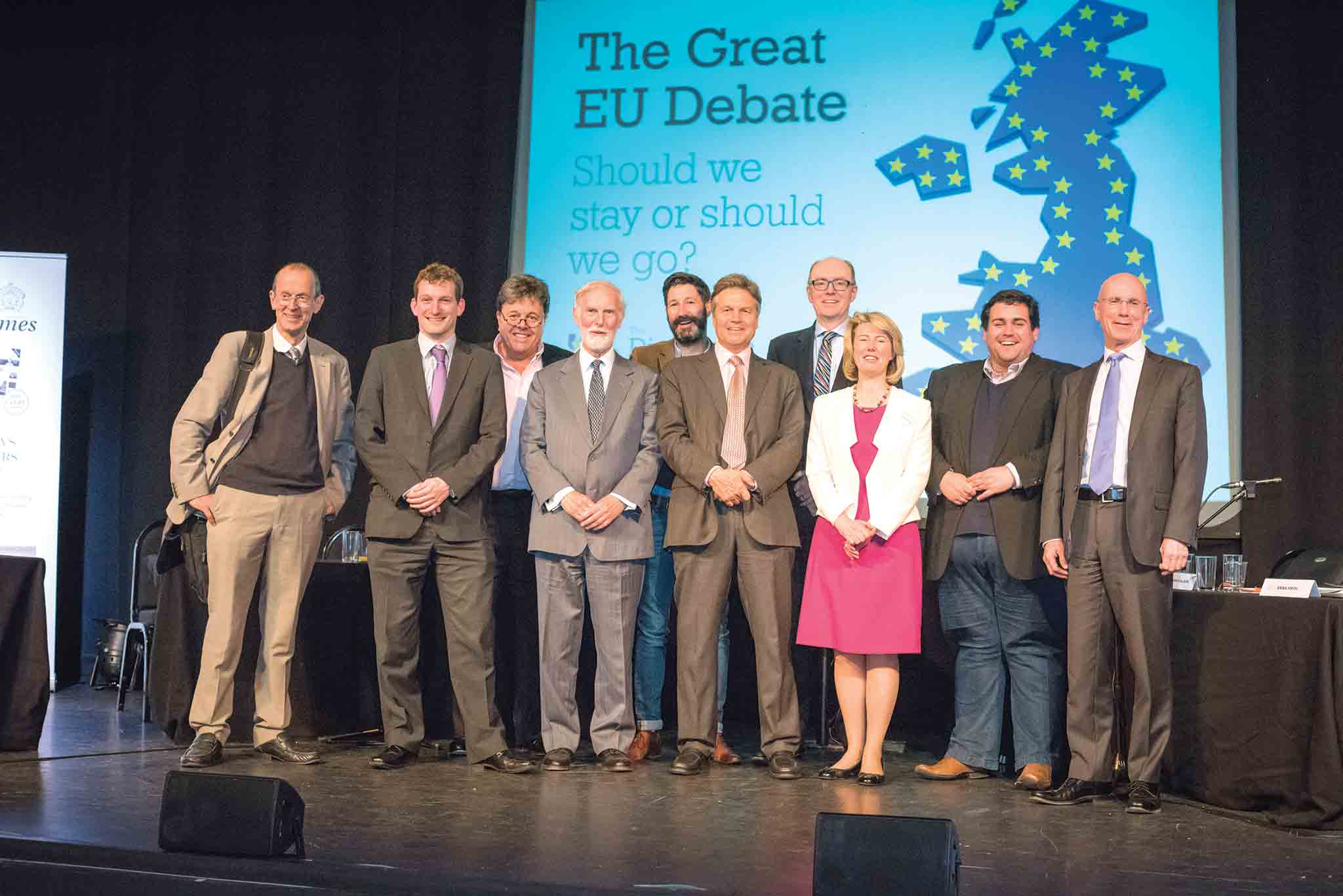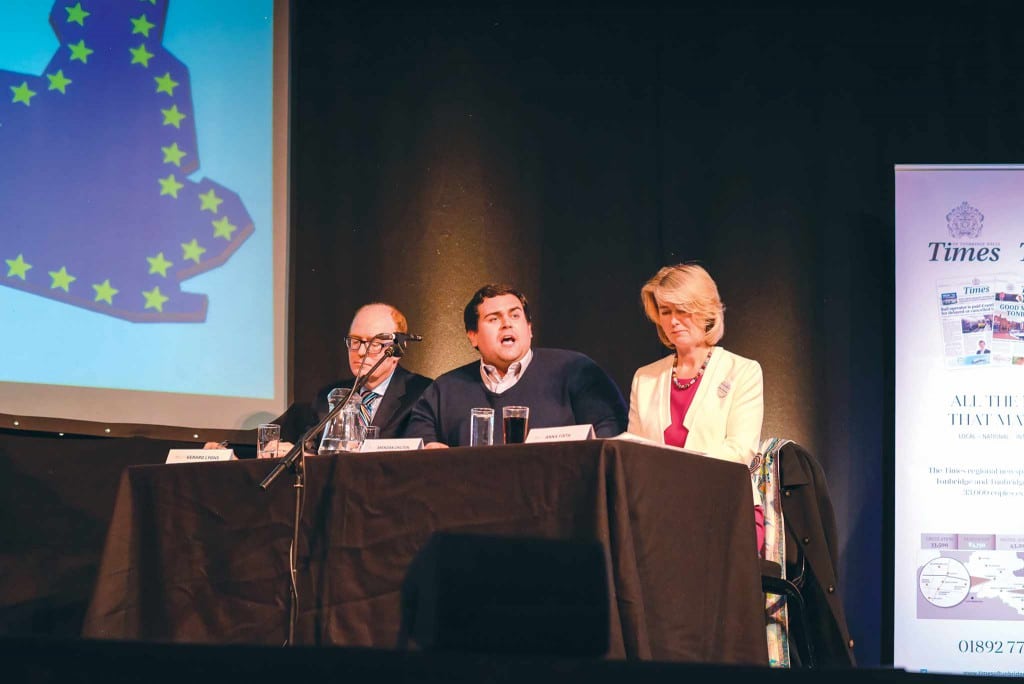Passions ran high when more than 300 people gathered at the Assembly Hall last Wednesday to take part in one of the biggest, most controversial debates in the town’s history – sponsored by the Times of Tunbridge Wells.
With the referendum on Britain’s EU membership just around the corner (June 23) the panellists in both the Remain in Europe and Brexit camps vied to win the audience across to their point of view. A panel of businessmen represented the local economy, and ITN’s 5 News Political Editor Andy Bell was in the Chair.
There was everything to play for as a pre-debate vote by the audience revealed a near 50/50 split in those supporting ‘Remain’ and those favouring ‘Leave’, with the Remain camp maybe a fraction ahead. The three main themes were the economy, immigration and sovereignty and while there was inevitably some overlap, we have distilled the most salient points and arguments into these three categories.
The Economy…
Seen as the Remain campaign’s trump card, polling has consistently shown this to be one of the main concerns for the British public when it comes to making their decision.
What did the panellists say?
Opening for the Remain side, Ben Patterson, a former Conservative MEP, criticised the current national debate as two sides ‘hurling statistics’ at each other.
He argued what was important was having a single regulatory framework in order to facilitate trade, adding: “The single market gives us enormous opportunities. It makes obvious sense, if you have goods moving around, to have only one set of regulations rather than 28 conflicting ones.
“We need to be ‘at the table’ when these decisions which affect us are being made.”
He said Britain had ‘benefitted hugely’ from its access to the market, and much of it was the result of British infl uence, adding: “The single market is our creation, why would we want to leave it?”
His views were echoed by fellow Remain panellist Professor Philip Davis, a former Bank of England economist.
Professor Davis said the UK’s future would be ‘extraordinarily bleak’ if there was a Brexit, adding: “It is young people who are most at risk.”
He questioned what type of trade relationship Britain would have with Europe afterwards and accused those supporting an Out vote of not having any clarity on the issue.
“Britain has benefi tted from growth and inward investment brought about through the remarkable growth in trade we have experienced by being part of a single market with over 500 million consumers. Car plants have come here, the City (of London) has grown remarkably – those things are at risk.”
Andy Bagnall, of the Confederation of British Industry (CBI), highlighted the fact that 80 per cent of businesses belonging to the CBI wished to stay within the EU, claiming they fear a ‘signi? cant economic shock’ if Britain were to leave.
He added: “Currently around 50 per cent of our trade is with the EU, whereas it is less than ten per cent the other way round. To say they need us more than we need them is not true.”
Dr Gerard Lyons, an economist and former adviser to Boris Johnson, hit back for the Brexit campaign, arguing there was no need to be in the EU to trade with the bloc.
“Thanks to globalisation, economics no longer knows borders. In contrast, the EU has become centralising, regulating and controlling. It is like walking on an escalator in the wrong direction and it is going to get worse.
“The EU is the slowest-growing region in the world and at its core is the unstable euro. It is uncertain and dangerous. If we exit the EU we can trade freely under World Trade Organisation rules and trade with who we want.”
Anna Firth, a lawyer and Conservative Party member campaigning for Out, highlighted the EU’s perceived inability to make any signi? cant trade deals with growing economies as one reason why the UK should leave.
“The EU has signed roughly €7trillion (£5.34trillion) worth of trade deals, whereas a country the size of Switzerland has managed to sign €40trillion. That is what we could do if we did it ourselves.”
She added that while trading under WTO rules, any tariffs would be ‘wiped out’ and offset by a devaluation in the pound.
In addition, she berated the CBI and other organisations making economic cases for Remain for being the same people who argued for Britain to join the euro: “And look at what would have happened if we had.”
Lastly for Brexit was Brendan Chilton, of the Labour Leave campaign, who said remaining in the EU would mean workers were being undercut by cheap labour and seeing their wages squeezed.
He also countered Mr Bagnall, stating: “Germany exports £11.5billion worth of cars to us every year, Italy sell us £360million worth of shoes and France £940million worth of wine.
“Do you really think they are going to cut off their nose to spite their face? Of course they are not and it is nonsense to suggest so.”
Immigration…
A hot topic, with recent studies showing net migration reaching an all-time high, with 330,000 more people entering the UK than leaving last year. This figure is driven by a record number of immigrants from the EU.
The issue ties in with matters of security, national identity and economics. It is the main focus of the Out campaign so far.
What did the panellists say?
Professor Davis, on the Remain panel, was the first person to speak on the issue. He said:
“Freedom of movement is a fundamental part of the European Union and it is a two-way street.
“Clearly there are about 3.3 million EU citizens in the UK, but there are about 2.2 million UK citizens who spend at least part of the year in the EU.”
He added that concerns about job losses, wages and the capacity of the infrastructure were ‘misplaced’ because “Immigrants bring income, tax revenue and some set up firms, too, creating more jobs.
“It is a failure of the British Government, not the EU, to not train people in this country to fill those roles.”
Mr Bagnall also supported the free movement of people, arguing they plug gaps where there is a skills shortage and actually increase job security.
He said: “Having the free movement means firms can employ people without all the hassle of visas and any other admin to get the staff with the skills they require.
Recalling the example of a company which makes specialist pumps for the North Sea, Mr Bagnall said without their access to foreign skilled labour the firm would go bust.
“If you shut the border and prevented them from drawing on that wide pool of talent it is not protecting jobs here, it would cost jobs because it would go out of business and you would lose the jobs it supports here.”
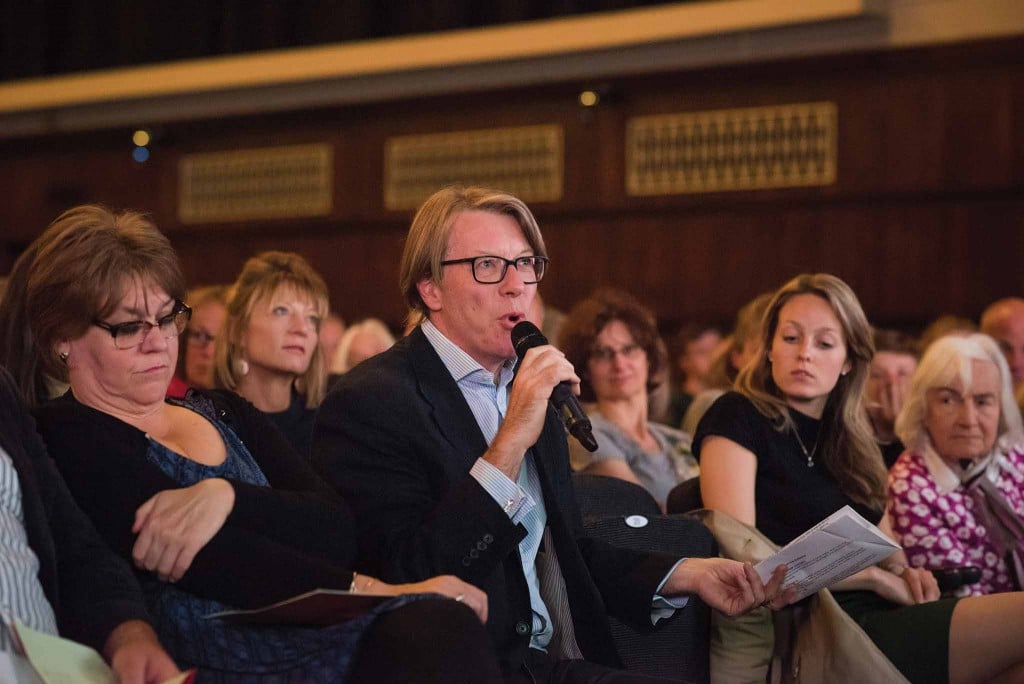
Mr Patterson received the biggest cheer of the night when he warned that far from seeing services under too much pressure, ‘the NHS would have collapsed if it were not for immigration’.
There is an ‘awful lot of rubbish’ said about immigration, Mr Patterson believes, claiming that the majority of migrants are actually from ‘outside of the EU’ and many of them are students.
Mrs Firth, speaking for Out, conceded there was a skills shortage in the UK, adding that these vacancies were being filled by people from the EU.
She continued: “But in my opinion this is a question of fairness and a question of finances. Because the reality is, whether your firm needs them or not, the sheer number of people coming in is simply unsustainable.”
She compared the influx to having to accommodate a town the size of Newcastle each year, saying: “People should be allowed to come into this country based on their skills, not their country of birth.”
Mr Chilton spoke passionately on the topic, saying the EU was allowing the ‘exploitation’ of workers due to free movement.
“What we actually have as members of the European Union is not free movement of people, but free movement of labour.
“Companies have the ability to move cheap labour around the continent to suit the needs of profit. I believe we should be treating people fairly and decently but what we have seen across the EU is wages going down.”
He flagged up a comment by Stuart Rose, the former Marks & Spencer Chief Executive – and advocate of a Remain vote – who ‘warned’ that if Britain left, wages would rise.
“I don’t know about you,” he told the audience, “but I would quite like wages to go up in this country. Being in the EU is a drive to the bottom.”
Sovereignty…
The most abstract of the arguments due to the difficulty in quantifying it and the subjective nature of what constitutes sovereignty. Nonetheless, it is an emotive topic and one that is often the cause of the bitterest disputes.
What did the panellists say?
Mr Chilton made an impassioned speech for why we should leave.
“We are told the European Union is some benevolent institution that does us all good. Tell that to the millions unemployed in Greece that suffer austerity and the young people in Spain whose futures have been blighted.
“Tell that to all those suffering and opposing the centralisation of power in this undemocratic union. The EU executive, the European Commission with people like (EC President Jean-Claude) Juncker in it, is unaccountable and we cannot remove them.
“Not one of them has faced the ballot box. You cannot put a price on democracy and the House of Commons had no right to surrender the sovereignty which it has without the consent of the British people.
“We should vote for freedom and vote for the real progressive alternative – an independent Britain with the ability to govern itself and determine its own future.”
Backing Mr Chilton’s point, Mrs Firth said:
“When you take into account regulations from the Commission, combined with direct legislation, then 64 per cent of the rules we enforce come from Brussels.
“In other words, the majority of time now spent in government is doing things the Commission is asking us to do.
“The minority of time is now spent on domestic UK business that we vote our politicians in to do. It is the wrong way round and the only way to reverse it is vote Leave.
“Do we want to be a part of the United States of Europe, much like a state in America, or do we want to be more like Canada – to have a trade relationship while maintaining our sovereignty?”
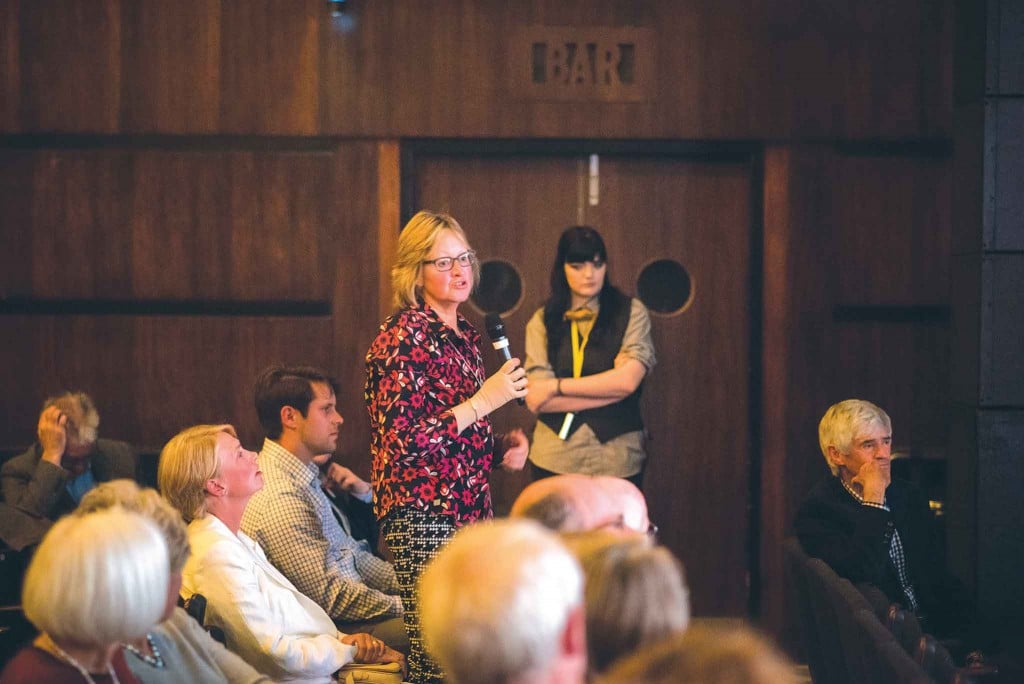
Mr Lyons suggested the ‘democratic deficit’ was part of the reason why Europe was now seeing a rise in extremist parties.
He said: “It is amazing how much power has been ceded to the EU, how little influence we do have, which was shown by how the Prime Minister did not achieve any reform in his attempted renegotiation.
“When the Prime Minister pushed for reform from the EU, he asked for little, he got even less.”
Mr Bagnall retorted that most of the rules and regulations are so specific that they have little real impact on Britain, using an example of Danish fishery rules, which must be observed here in theory but do not affect the UK.
He said: “They are using a number which creates an impression of a dominance by the EU over issues discussed in Parliament.
“But just look at the Queen’s Speech, there are a huge number of bills in there and hardly any of them are a direct result of the EU.”
Professor Davis mocked the idea of Britain ever being truly liberated from outside in?uence stating:
“Sovereignty is not an absolute concept – it is not like pregnancy, where you are either pregnant or you are not. Sovereignty is a relative concept.
“You pool it in order to get control over things like cross-border pollution, ? nancial regulation and other aspects that we need to control in terms of globalisation.”
He pointed out that the country has signed 700 treaties with multilateral compromises: “Do you want to abrogate all of those?
“If you want absolute sovereignty you can be like North Korea, but I don’t think that is what people want.
“We have in?uence in exchange for the sovereignty we have pooled. Britain is strong enough to lead in the European Union and that is what we should be doing.”
Mr Patterson, echoing Professor Davis, said: “The House of Commons has voluntarily surrendered certain aspects of our sovereignty for the greater good and in order to uphold our international treaty obligations.”
He added: “The important thing is to be there when the decisions are taken rather than just leave it and let others make the decisions. Is it all going to a single European state? As far as I know, that idea died a long time ago.”
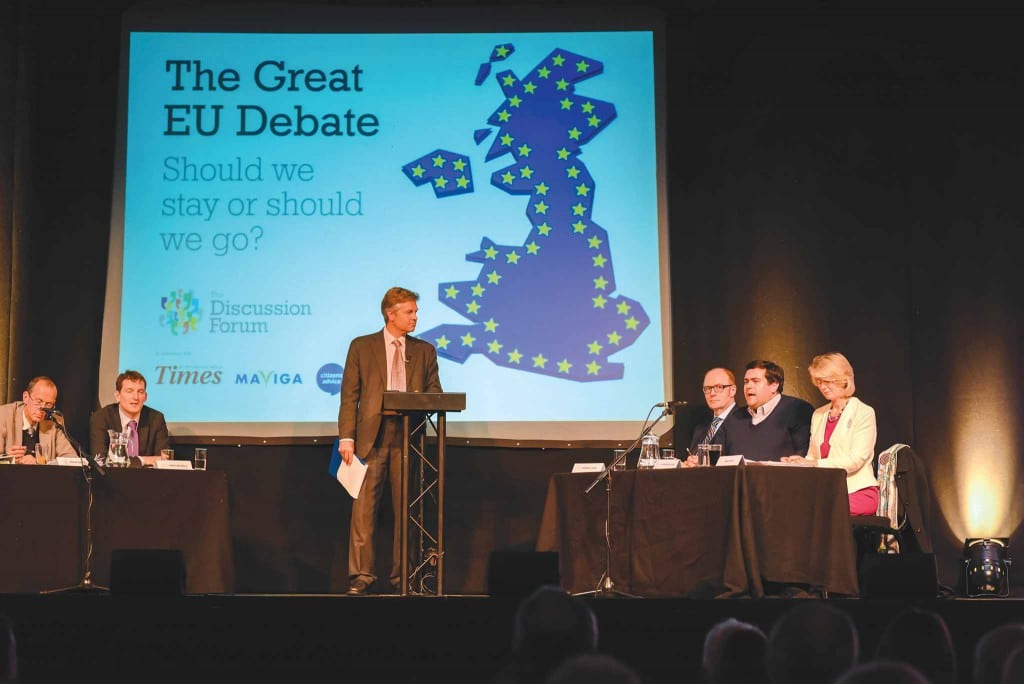
Roundup…
The vigorous debate clearly exposed a divided audience with the more impassioned rhetoric often bringing cheers from the supporters of each camp. Ultimately, however, the Out campaign had less success in winning over the undecided voters, resulting in a further shift towards Remain during the post-debate vote.
The Out panel…
Dr Gerard Lyons
(left)
An economist who has repeatedly been awarded ‘top forecaster’ by The Sunday Times, he predicted in 1999 that the euro would run into trouble. Mr Lyons was also an adviser to Boris Johnson while he was the Mayor of London.
Brendan Chilton (centre)
The General Secretary of the Labour Leave campaign, he unsuccessfully stood as the Labour candidate for Ashford, Kent in the 2015 General Election. A local councillor for Ashford Borough Council, he is also director of the Swales Academies Trust in Sittingbourne.
Anna Firth (right)
A Conservative representative for Erith and Thamesmead and a lawyer by profession, Mrs Firth is a strong supporter of an Out vote in the upcoming European Referendum and focuses on encouraging women to support a Brexit.
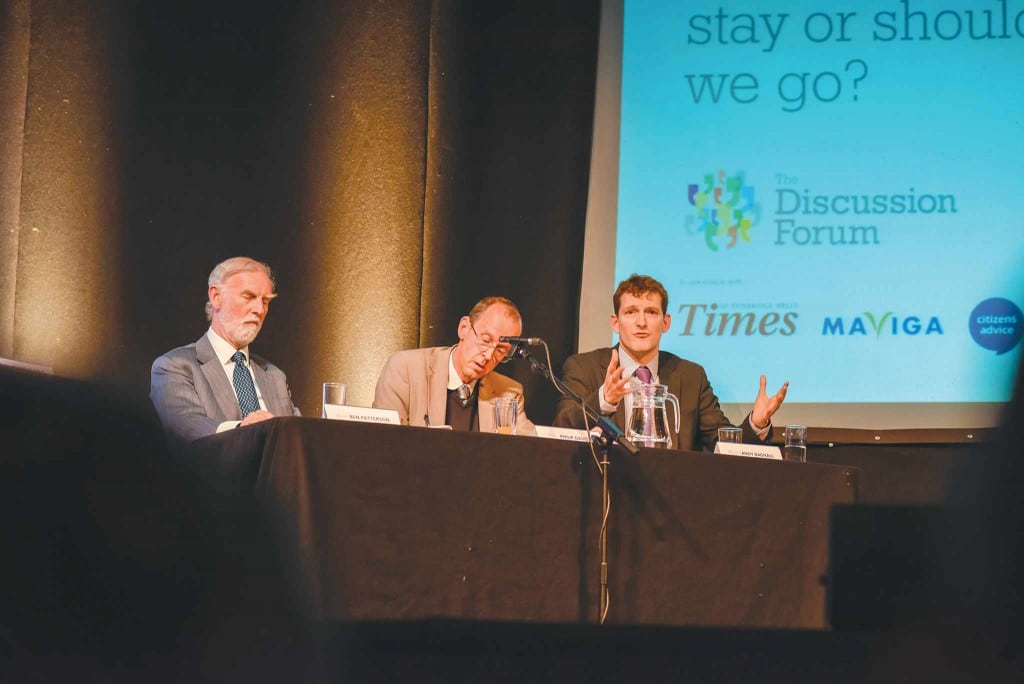
The In panel…
Ben Patterson
(left)
A former President of the West Kent European Movement and Conservative MEP, Mr Patterson is a writer with publications including The Conservative Party and Europe (2012) and most recently a book of science fiction short stories.
Professor E Philip Davis (centre)
Visiting Fellow of the National Institute of Economic and Social Research and Professor of Banking and Finance at Brunel University, Mr Davis has worked as an economist at the Bank of England, the Bank for International Settlements and the European Monetary Institute.
Andy Bagnall (right)
Director of Campaigns at the CBI, Mr Bagnall has a background in election organisation at local and national level including running the leadership campaign for David Miliband in 2010 as well as advising on state elections in Sydney, Australia.
Who were the business panel, what did they say and how would they vote?
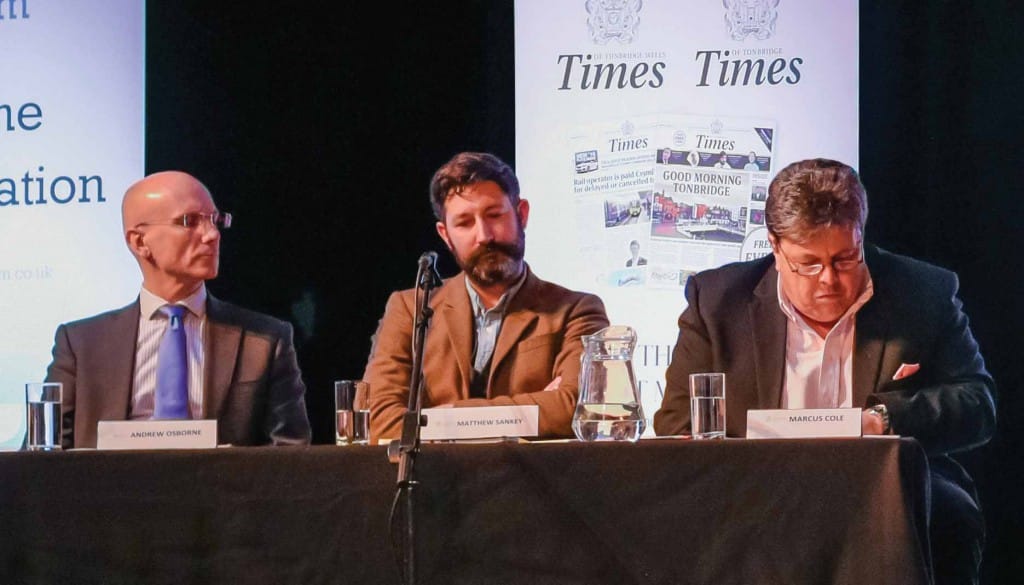
Andrew Osborne – MD Single Source Binding Machines
(left)
Owner of a binding machine company in Tunbridge Wells which sources most of its products from Germany, a known advocate of Brexit and on first-name terms with UKIP leader Nigel Farage.
What he said: “If you look at the problems when you get a big bloc working together like the USA or the EU, we all sink if we are in it together. Look how long it takes to get a decision. We are missing out on so much.”
Position before debate: Voting out
Position after: Voting out
Matthew Sankey – Owner of Sankeys chain (centre)
Mr Sankey took over the management and majority ownership of Sankey’s seafood restaurant and bar on Mount Ephraim from his father, before expanding into wholesale, a fishmongers and an upmarket venue on The Pantiles.
What he said: “If we come out of the EU we’d be able to alter VAT legislation, power and energy. The hospitality industry has been trying to lobby for reduced rates, we’re often told you can’t have that as you’re in the EU. France, Spain, Germany have got it, how would leaving change that?”
Position before debate: Undecided
Position after: Voting to remain
Marcus Coles – Maviga plc (right)
Based in Yalding, Mr Coles founded Maviga in 1994. The company trades globally in dried crops, pulses and other speciality crops, including sesame seeds.
What he said: “The whole theme and colour of this is that we have a lot going for us right now, we’ve got a foot in Europe. What’s going to be so much better about leaving it?”
Position before debate: Voting to remain
Position after: Voting to remain


